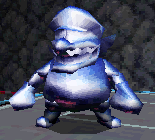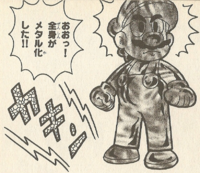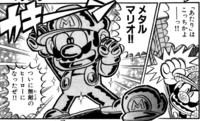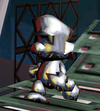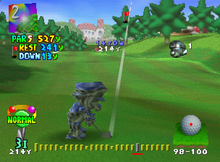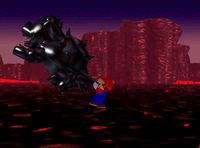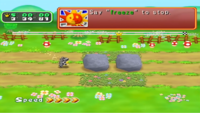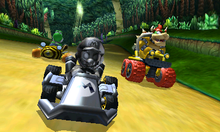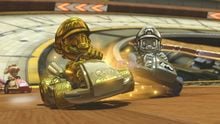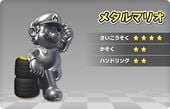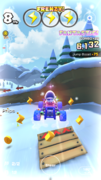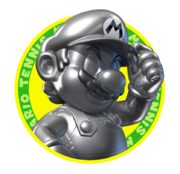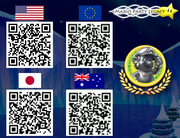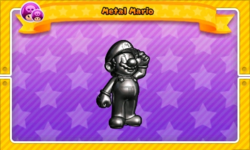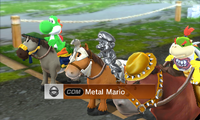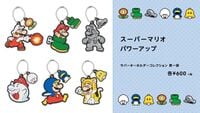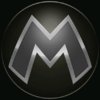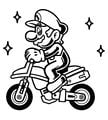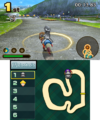Metal Mario
| Metal Mario | |
|---|---|
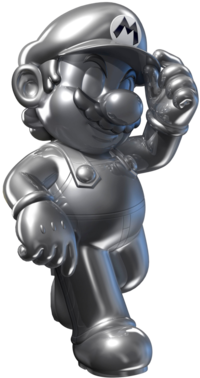 Artwork from Mario Kart 7 | |
| Applies to | Mario, Luigi, Peach, Daisy, Yellow Toad, Blue Toad, Toadette, Yoshi, Red Yoshi, Light-Blue Yoshi, Yellow Yoshi, Nabbit, Wario, Dr. Mario, Bowser, every other playable character in Mario Party 6 / Mario Party 7 and the Super Smash Bros. series |
| Item needed | Metal Cap (Super Mario 64) Power Flower (Super Mario 64 DS, exclusive to Wario) Wonder Flower (Super Mario Bros. Wonder) Megavitamin (Dr. Mario 64) Metal Mushroom Orb (Mario Party 6 and Mario Party 7) Metal Box (Super Smash Bros. series) |
| Power(s) given | Invincibility, immunity to poison air, underwater breathing, increased strength and weight |
| First appearance | Super Mario 64 (1996) |
| Latest appearance | Super Mario Bros. Wonder (form from a Wonder Effect) (2023) |
- “When you want to wrap yourself in nostalgia, and then in aluminum foil.”
- —Metal Mario Suit description, Super Mario Odyssey
Metal Mario (originally also referred to as Metal-Head Mario) is a recurring power-up and variant of Mario that first appears in Super Mario 64. Metal Mario is tougher, heavier, stronger, and virtually invincible except from long falls. This form is acquired through various means, such as by picking up a Metal Cap or Metal Box or using a Metal Mushroom Orb. Later games also feature other characters receiving the metal power-up, such as Mario Party 6 and the Super Smash Bros. series.
Metal Mario has also sometimes appeared as a separate character from Mario, such as being a late-game boss in certain Super Smash Bros. games, one of the several opponents in the Game Boy Color version of Mario Golf, and a playable character in several Mario Kart games and other spinoff games of the Super Mario franchise. His voice varies between games, with him sharing Mario's voice (in Mario Golf), sharing Mario's voice but with a filter (in Mario Tennis Open), or having unique lines and with a filter (such as in Mario Kart 7). Some of his unique lines are altered versions of Mario's lines, such as "Mia mama" as opposed to Mario's "Mama mia" and "Papà" instead of "Mama."
Prior to Metal Mario's debut, Shigeru Miyamoto possibly hinted at a later appearance of such a power-up during an interview in Nintendo Power's Mario Mania Player's Guide published in 1991. Miyamoto reportedly said: "Who knows what Mario will look like in the future? Maybe he'll wear metallic clothes!"[1] The Metal Mario form's first appearance was in 1996, five years later. One of the earliest visual depictions of a metallic Mario, however, occurred in a Super Game Boy commercial, which predates Metal Mario's first appearance by two years.[2]
Metal Mario is often portrayed without eye details, though some depictions do show an iris, such as in official art for Puzzle & Dragons: Super Mario Bros. Edition and in some merchandise such as JAKK's Pacific World of Nintendo series and the Super Mario Power Up keychains.
History
Super Mario series
Super Mario 64 / Super Mario 64 DS
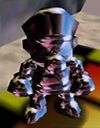
Debuting in Super Mario 64, Metal Mario is first obtained after Mario enters the portal for the Cavern of the Metal Cap in the Hazy Maze Cave and automatically transforms. After hitting the green Metal Cap Switch, he activates green blocks, which drop Metal Caps. When he picks up the Metal Cap, he transforms into Metal Mario. In this form, Mario is invincible (although he can still take falling damage) and can destroy enemies just by running into them. Metal Mario is also very heavy, and as such, he can withstand strong winds and underwater currents and can walk on the bottom of bodies of water. In addition, he does not need to breathe, meaning he can stay underwater and walk through poisonous gas. This power-up expires after a certain time; before the power-up disappears, Mario flickers to normal. Despite being heavy, Metal Mario still retains all his physical speed as well as his athletic jumping abilities, but he sinks in quicksand faster, and he cannot run underwater. Metal Mario vocalizes normally above water, but when underwater, he is silent.
The Hazy Maze Cave's mission Metal-Head Mario Can Move! contains one Power Star that can be obtained from using the power-up. In the large circular room filled with water and with Dorrie, a Purple Switch is located underwater. Mario can transform into Metal Mario from the Metal Cap in the green block located in the entrance, near the elevator. As Metal Mario, Mario can then sink to the floor and activate the Purple Switch, which causes a gate to open. Behind the gate is a door to a hallway that contains a Power Star. For the missions Navigating the Toxic Maze and A-Maze-Ing Emergency Exit, Metal Mario's immunity to strange clouds can help Mario navigate the labyrinth.
Jolly Roger Bay's mission Through The Jet Stream features a Power Star inside a strong current. Metal Mario can be used to easily obtain the Power Star.
In Dire, Dire Docks, Metal Mario can combine his Metal Cap with the Vanish Cap to become Vanish Metal Mario, which enables him to go through certain walls while maintaining his metal form's strengths and weaknesses. With this combination, he can reach the Power Star in the mission Collect the Caps... Like in Jolly Roger Bay's mission, Metal Mario is used in the mission Through the Jet Stream to resist a current so Mario can pass through bubble rings and eventually collect the Power Star.
The music that plays when the player is Metal Mario is an arrangement of the Starman's theme. Metal Mario's environment map texture (which is also found on the portals to the Hazy Maze Cave and Cavern of the Metal Cap) is actually a fisheye photo of a garden.[3] The pink colors evident on the metal are from flowers.
Once the Metal Cap Switch is activated, Mario can transform into Metal Mario in the following courses: Whomp's Fortress, Bowser in the Dark World, Jolly Roger Bay, Hazy Maze Cave, Dire, Dire Docks, Wet-Dry World, and Cavern of the Metal Cap.
In Super Mario 64 DS (herein known as Metal Power),[4] only Wario can turn metallic by using a Power Flower (other characters must transform into Wario with the Wario Cap). Since Power Flowers appear in more levels than the Metal Cap, the metal power can be used in more levels. Metal Wario can walk on lava and freezing water, though after a while, he begins to sink, and if he goes below the surface, he loses a life, like with the slower quicksand. While sinking underwater, Metal Wario can also move freely, unlike Metal Mario, who only falls in a straight line. Like Metal Mario, Metal Wario vocalizes above water and is silent underwater, but unlike in Super Mario 64, Metal Wario yells if he falls a distance underwater.[5] Metal Wario's other abilities and vulnerabilities are the same as Metal Mario's. The mission Cruiser Crossing the Rainbow in Rainbow Ride is altered from the original so the Power Star appears at the end of the bowsprit instead of on the bow. Additionally, high winds can potentially block characters from obtaining the Power Star. Metal Power can be used to resist the winds and help Wario collect the Power Star. In Chief Chilly Challenge, Luigi, transformed as Wario, uses Metal Power to cross a passing and resist high winds so he can break a Black Brick for a Power Star. Due to the character dependencies of the Power Flowers, the mission Collect the Caps... has been renamed "Inside the Cage," and the metal power-up cannot be used to collect the Power Star inside the cage. Only Luigi can turn invisible from the Power Flower, but he can, however, swim fast enough to reach the Power Star in time. The Mega Mario and Fire Power themes from Super Mario 64 DS are arrangements of Metal Mario's theme music.
Super Mario Odyssey
In Super Mario Odyssey, a cap and outfit based on the Metal form's Super Mario 64 appearance (named the Metal Mario Cap and the Metal Mario Suit, respectively) can be purchased from Crazy Cap stores. The outfit costs 2,000 coins and is available after 540 Power Moons have been collected, and the cap costs 1,000 coins and is available after 560 Power Moons have been collected, making it one of the last outfits to obtain in the game. Aside from allowing Mario to enter a specific area in the Mushroom Kingdom, this outfit is aesthetic and serves no other gameplay advantage. Clanking can be heard as Mario walks in the outfit, and Cappy makes an audible clink if he hits a wall when thrown. The description for the Metal Mario Suit is "When you want to wrap yourself in nostalgia, and then in aluminum foil," possibly implying that Metal Mario is specifically made of aluminum.
Super Mario Bros. Wonder
In Super Mario Bros. Wonder, in the level High-Voltage Gauntlet in Bowser's portion of the Petal Isles, playable characters (Mario, Luigi, Princess Peach, Princess Daisy, Yellow Toad, Blue Toad, Toadette, Yoshis, and Nabbit) take on a metallic form as the level's Wonder Effect. There is also a new variant of the Metal Mario theme from Super Mario 64. This variant of the metal form gives the characters a simple metal sheen (likely to prevent confusion among multi-colored Toads and Yoshis during multiplayer) and protects them from the enemies and the electricity in the level, as well as making them heavier than without the metal form. Touching electricity will charge the character, causing them to emit light and magnetically attract nearby coins for a time. Characters also have their voices filtered, though as a reverb than Metal Mario's distorted voice in the spinoffs.
Super Mario (Kodansha manga)
Metal Mario appears in the second volume of the Super Mario 64 arc of the Super Mario Kodansha manga series. In the third chapter, referred to as "Mario C", Mario enters the Cavern of the Metal Cap. He first activates the ! Switch and then hits a ! Block to get a Metal Cap. After easily defeating Snufits as Metal Mario, however, he falls into the current and gets taken to the moat of Peach's Castle. Still metallic, Mario, reenters Hazy Maze Cave in Peach's Castle. The Scuttlebugs, who were attacked by Mario earlier, recognize Mario and try to escape. Several Swoops and Monty Moles try to stop Mario, but he defeats them. The Scuttlebugs eventually fall into water and drown. Mario then takes off the Metal Cap so he can jump to a door on a higher part of the area, and he obtains a Power Star.
The form briefly appears as a gag in the third volume of the arc. Mario, in the downtown area, Wet-Dry World needs to be in Vanish form to reach a Power Star in the cage, but has only the Metal Cap and the Wing Cap. He is seen in one panel being briefly Metal Mario with a Wing Cap, and this results in his destroying the downtown area. Mario finally gives away his Metal Cap to a playful Ukiki during his time at Tall, Tall Mountain. This turns the Ukiki into metal form.
Super Mario-kun
The 17th volume of Super Mario-kun includes a few appearances of the Metal Mario form, being based off Super Mario 64. In the 12th chapter, the Metal power-up is prominently featured at the beginning. As Metal Mario, Mario is immune from the shots fired by several Snufits. The first instance of it, however, appears to be a dream as Toad shortly smacks Mario awake after. Mario later uses it in the same place as in Super Mario 64, in the Metal Cavern, where he also easily takes shots from the Snufits. The Snufits, however, shoot water on him. Dorrie then emerges from the scene, chews Mario into a metal disk, and then spits Mario at the Snufits, defeating them.
The power-up briefly appears in the 13th chapter. Bob-omb Buddy kicks Mario into Unagi's mouth, only for Mario to escape from it and then defeat it with the Metal Mario powerup. Mario earns a Power Star and then retaliates by kicking the Bob-omb Buddy.
Mario no Bōken Land
Mario no Bōken Land is a Japanese activity book featuring events from several games. In the Super Mario 64 segment, Mario uses the Metal Mario form to defeat Eyerok. The powerup has various embossed katakana spelling "メタルマリオ" (Metaru Mario, or "Metal Mario") around his body.
Super Smash Bros. series
- SmashWiki article: Metal Mario
Super Smash Bros.
| Super Smash Bros. fighter Metal Mario |
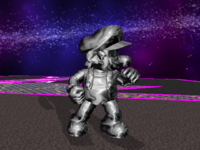
|
| Game appearances |
|---|
| Super Smash Bros. Super Smash Bros. Melee Super Smash Bros. Ultimate |
| Special moves |
| Neutral: Fireball Side: Cape (Melee) Up: Super Jump Punch Down: Mario Tornado |
| Battle entrance |
| Metal Mario pops out of a Warp Pipe. (64) Metal Mario falls from the sky and lands headfirst onto the stage, then stands up afterwards. (Melee) |
In Super Smash Bros., the Metal Mario character makes his debut as a late-game boss encountered in Stage 9 out of 10 stages. He has his own stage, which is playable only in the single-player mode of the game, and he has a unique series icon (being a metallic version of the Mushroom), stock icon, and a metallic-sounding announcer call unlike other games. Unlike the power-up's original invincibility, other characters can deal damage on him. He is, however, a far more durable character than the regular Mario; in fact, he is the heaviest and most resistant character in the game. When his damage percent is low, weaker attacks cannot flinch him, and attacks start flinching him only at far higher percentages. Due to his high weight, however, he has trouble recovering when he is knocked off the stage. Additionally, Metal Mario does not dash; he mostly patrols the stage, only attacking when his pacing is interrupted.
Metal Mario inherits Mario's attributes from the Japanese version of the game, and due to being stored as a separate character from Mario, this does not change between versions. As a result, some of his attacks have slightly different properties from Mario's in the North American and European versions, and his model has slightly different body proportions.
On a side note, Kirby is unable to copy Metal Mario's powers, which is later possible to do in Super Smash Bros. Melee, due to his now being Mario with a modifier as opposed to a separate character.
Super Smash Bros. Melee
Starting in Super Smash Bros. Melee and continuing in later games, players can pick up the Metal Box as an item and gain metal forms for a limited time. While metal, they are heavier; their jumping height is lower, their falling speed is faster, they do not flinch from weaker attacks especially at lower percentages, and they require higher percentages to be launched. Their voice effects are muted (though they still make sound effects where applicable, notably Mr. Game & Watch), and their footsteps make clanging metal noises. The metal duration can last shorter if players take enough damage.
In level 10 of the game's Classic mode, a random character in a permanent metal form is always one of the opponents.
In Adventure mode, the Metal Mario character returns as a mid-boss in Adventure Mode, being fought on Battlefield. Metal Mario fights alone by default, but if the player has unlocked Luigi, Metal Luigi appears as well. They both retain Metal Mario's strengths from the original Super Smash Bros.: they are very heavy opponents who are difficult to launch off the stage, but cannot recover once they are knocked down. However, they are far more aggressive than Metal Mario is in the previous game. KOing Metal Mario and Metal Luigi in Adventure Mode awards the player the "Metal Bros. KO" bonus, worth 8000 points.
Unlike Metal Mario, Metal Luigi does not reappear as a non-playable character in the subsequent Super Smash Bros. installments.
Metal Mario also appears as one of the many collectible trophies in the game. Yoshi's Island, a stage in the game, is reflected on the texture of Metal Mario's model on this trophy.
Super Smash Bros. Brawl
In Super Smash Bros. Brawl, the metal form can be enabled as a setting in Special Brawl, as well as corresponding Special modes of the subsequent games, where it is permanent. In Classic mode, a character in metal form can appear at random from Levels 6 to 10.
Super Smash Bros. for Nintendo 3DS / Super Smash Bros. for Wii U
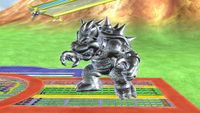
Opponents in metal form, marked as intruders, can be encountered in the single player Classic Mode of Super Smash Bros. for Wii U. When the player chooses a battle in the first five rounds, one or more opponents might suddenly be replaced by an intruder, marked by a glowing yellow trophy base, even in a team battle. Intruders are always in a permanent Giant or Metal state, but leave a reward if they are defeated.
Additionally, the Metal Box is also available as a red item in Smash Tour, giving players the ability to start a battle in metal form. Crazy Orders may also feature a Metal Battle as a potential order option.
In Smash Run of Super Smash Bros. for Nintendo 3DS, alongside the Fighting Mii Team, normal-sized and giant Metal versions of the player's character may appear in the game's Multi-Man Smash Final Battle as opponents.
Super Smash Bros. Ultimate
In Super Smash Bros. Ultimate, Metal Mario appears as the final boss in Bowser's classic mode route, appearing after Mario is defeated during the battle in a similar manner to Giga Bowser in Mario's route and in Melee. He also appears as a high-tier Ace-class Shield-type primary spirit, using his Mario Kart 7 artwork. The spirit's trait increases a fighter's weight during battle, which helps a fighter's longevity but increases their falling speed, similar to Metal Mario's traits. The spirit itself has very high defense, even for an Ace spirit, though with low offense as a trade-off. Due to its high stats, it has only one available support slot. Since it is Shield type, it resists Attack-type spirits but is weak to Grab-type spirits. In the spirit's battle, the player faces a metallic Mario on the Battlefield form of The Great Cave Offensive as a reference to his battle on Meta Crystal in the original Super Smash Bros. due to both having large crystals.
Metal Mario's core can be combined with the cores of a Super Mushroom and a Fire Flower to summon the Gold Mario spirit.
Metal Mario's B Dasher, using the Mario Kart 7 artwork, is also featured as a spirit.
Mario Golf
Metal Mario makes his playable debut as an unlockable character in Western releases of Mario Golf only. He is unlocked when all 108 Birdie Badges are collected. He boasts the strongest drives from his set of clubs, meaning he can hit the ball the furthest out of any character in the game, though his sweet spot and control come at a cost. Metal Mario's ball trajectory is a strong draw, meaning that the ball has a strong curve to the right. If Metal Mario scores a Nice Shot while using a power shot, the ball goes into flames, which is shared with the other Mario characters, namely Mario and Baby Mario. Metal Mario shares his voice clips as Mario. In Japanese versions of the game, Metal Mario is absent.
Although Metal Mario does appear in the Game Boy Color version, he is mentioned on the tournament board.
Mario Party series
Metal Bowser appears in Mario Party 2. The winner on Bowser Land heads to fight Bowser, but when they grab his tail, he transforms into Metal Bowser, making him impossible to lift. To deal with this, Toad offers a Power Star to give more power to the winner and thus, Metal Bowser is swung and thrown around the world. Crash-landing, Bowser's metal form is shattered to pieces, reverting him to his normal form.
The metal form also appears in Mario Party 6 and Mario Party 7 when one of the playable characters uses a Metal Mushroom Orb on themselves to avoid traps. In Mario Party 6's Star Sprint mode, the player can break obstacles while in their metal form. Also, in Speak Up, when a player gets a Cursed Mushroom Panel, Bowser makes a brief reference to Metal Mario, by saying, "Answer quickly or your bonus points will fall like a Metal Mario off an airship!"
Dr. Mario 64
In the story mode for Dr. Mario 64, Metal Mario is encountered in Wario's story if the story is played in Normal or higher difficulty without restarting a match once. After Wario defeats Rudy, Dr. Mario confronts Wario, who attempts to run off with the Megavitamins but trips over Mad Scienstein, causing the contents of the bottle to be accidentally ingested by Dr. Mario that turns him into Metal Mario. After Wario beats Metal Mario, Dr. Mario returns to normal. Once he is beaten the first time, Metal Mario can be selected as a character in VS mode. In VS mode, Metal Mario has the highest AI level available, tying with both Rudy and Vampire Wario.
Mario Kart series
Mario Kart 7
- “Metal Mario, the best!”
- —Metal Mario, Mario Kart 7
Metal Mario returns as a playable character in Mario Kart 7, where he is unlocked by winning the 150cc Special Cup. He is one of the four drivers to enter the Mario Kart series for the first time (the other three being Lakitu, Wiggler, and Honey Queen). He is a Heavy class character (alongside Bowser, Wario, and Honey Queen), with an advantage bonus of weight and some speed. Because he ranks among the Heavy class, Metal Mario is the fastest and heaviest character in the game, but he has the lowest acceleration and handling stats. Additionally, Metal Mario's karts have the same body frame size as that of the Medium class characters, which makes him a smaller target than the other Heavy and Cruiser characters. His signature emblem is a shiny, metal version of Mario's M logo. Bowser, Rosalina, or Mario always appear as rivals when he is picked. Additionally, Metal Mario has his own set of voice clips from Mario, and Mario Kart 7 is the first game in the Super Mario franchise where Metal Mario is given a filter to differentiate his voice from Mario's voice. Additionally, Metal Mario's cap emblem is not entirely metallic, making it more easily visible on his cap, and his M emblem is silver, but shown as dark gray in some art for contrast. Metal Mario's appearance in the Super Smash Bros. games, however, do not have this feature.
Metal Mario appears as the Normal and Expert Staff Ghosts for Neo Bowser City and Template:Classic-link.
Mario Kart 8 / Mario Kart 8 Deluxe
- “Let's-a-win!”
- —Metal Mario, Mario Kart 8
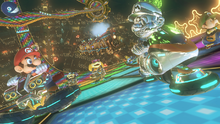
Metal Mario appears as a returning unlockable racer in Mario Kart 8. Additionally, there is another metal character named Pink Gold Peach (who is classified in the same weight subdivision as Metal Mario). Like in Mario Kart 7, Metal Mario is classified as a Heavy character, where he has high speed and weight, but lower handling, traction, and acceleration. His weight is the highest out of the roster, tied with Bowser, Wario, Morton, the large Miis, and Dry Bowser. As a trade-off, he also ties with them in acceleration and traction, having the lowest in the roster. However, unlike these characters, he has slightly higher handling, trading off with lower speed, making these stats match those of Rosalina, Donkey Kong, Waluigi, Roy, and Link.
Metal Mario, if used in Grand Prix, does not have a set rival in Mario Kart 8 unlike some other characters in the roster.
Also much like in Mario Kart 7, Metal Mario's (as well as Pink Gold Peach's) vehicles use the same body frame size as the Medium class characters, making him a smaller and slightly harder target to hit. His kart emblem is a gray version of Mario's signature "M" symbol with a light gray outline.
As with every character playable in Mario Kart 8, Metal Mario returns as a playable character in Mario Kart 8 Deluxe, this time being available from the start. Additionally, Metal Mario has a Gold Mario variant, which can be unlocked by winning every 200cc Grand Prix cup.[6] Although Metal Mario's statistics have been slightly altered when compared to the original Mario Kart 8, he is still a heavy character, classified in the same weight subdivision as Pink Gold Peach. His weight, however, is still the highest in the game, but he now has slightly higher acceleration than Bowser, Wario, Morton, the large Miis, and Dry Bowser, which used to be tied for lowest in the game. He also has higher speed than Rosalina, King Boo, and Link, but lower than Waluigi, Donkey Kong, Wiggler, and Roy; his speed is tied with Waluigi, Donkey Kong, and Roy in the original Mario Kart 8. His mini-turbo is now slightly higher, matching Waluigi, Donkey Kong, and Roy, instead of having the lowest in the game, and he also has slightly higher traction.
As a CPU opponent, Metal Mario's body, tire, and glider combinations include the following:
- Standard Kart, Standard tires, Super Glider
- Tri-Speeder, Metal tires, Super Glider
- Jet Bike, Metal tires, Super Glider
- Standard ATV, Monster tires, Super Glider
Metal Mario is now part of the rival system in the Grand Prix mode unlike in the original Mario Kart 8. If he is used, Pink Gold Peach is his rival and vice-versa. He also appears as the Staff Ghost used by Nin★Leonel for Template:Classic-link. This combo uses the Standard ATV, Monster tires, and Super Glider.
Mario Kart Arcade GP DX
Metal Mario appears in Mario Kart Arcade GP DX. Like his other playable appearances in Mario Kart games, Metal Mario is a heavyweight, with high speed, but below average acceleration and handling. His kart is the Metal Spark. Similar to Mario Kart 8 Deluxe, Metal Mario also has an alternate costume, Gold Mario, which not only changes Metal Mario's color scheme, but adds pupils to his eyes as well.
When used, the Heavy Mushroom turns racers and the karts metallic while granting them heavy weight. If they collide with rivals, they knock over the rivals and stop them. Metal Mario himself appears unchanged if he uses the item.
Mario Kart Tour
Metal Mario reappears in Mario Kart Tour as a High-End driver. His special skill is the Fire Flower, shared with his normal self. Metal Mario was featured in the Beta Test alongside a self-titled cup, and was added to the release version in the New York Tour. There is a small chance Metal Mario can be received in the first pipe pull.[7] Metal Mario has two variants, Gold Mario and a new variant being Ice Mario. Ice Mario shares animations with Metal Mario, though Ice Mario's voice is shared with Mario's voice, but with a reverb.
Metal Mario has been featured as a large opponent in various Vs. Mega bonus challenges, such as the bonus challenge in the 2019 Holiday Tour, the Mario Bros. Tour and the Super Mario Kart Tour, where he uses Fire Flowers. In the bonus challenge in the Mario Bros. Tour, he also uses Lightning, and in the bonus challenge in the Super Mario Kart Tour, he also uses Super Stars. The bonus challenge in the 2019 Holiday Tour returns in the 2021 Yoshi Tour, and the bonus challenge in the Super Mario Kart Tour returns in the Piranha Plant Tour.
Metal Mario has consistently appeared in regular tour pipes, including All-Clear Pipes, and is also a part of the base Daily Selects set. Additional availabilities for Metal Mario are listed in the following table by tour.
| Tour | Availability |
|---|---|
| New York Tour | Gold gift 250 Grand Stars |
| Paris Tour (2019) | Gold gift 200 Grand Stars |
| Trick Tour (2020) | Metal Mario Pack $19.99 / €21.99 / AU$30.99 April 22, 2020–April 29, 2020 |
| Super Mario Kart Tour | Metal Mario Pack $39.99 / €43.99 / AU$62.99 September 9, 2020–September 23, 2020 |
| 1st Anniversary Tour | Token Shop 50 event tokens |
| Mario vs. Luigi Tour (2020) | Team Mario Metal Mario Pack $19.99 / €21.99 / AU$30.99 November 25, 2020–December 2, 2020 |
| Rosalina Tour | Tier Shop 12,000 coins December 16, 2020–December 22, 2020 |
| Peach vs. Daisy Tour | Token Shop 100 team tokens |
| Mario Tour (2021) | Iron Cucumber Pack $39.99 / €43.99 / AU$62.99 March 16, 2021–March 23, 2021 |
| Bowser vs. DK Tour | Token Shop 100 team tokens |
| Summer Tour (2021) | Premium Challenges card completion reward |
| Mario vs. Peach Tour | Gold gift 100 Grand Stars |
| 2nd Anniversary Tour | Token Shop 100 event tokens |
| Halloween Tour (2021) | Tier Shop 12,000 coins October 20, 2021–October 26, 2021 |
Mario Kart Live: Home Circuit
Mario and Luigi resemble their metal forms in Mario Kart Live: Home Circuit if they equip the silver suit. The silver suit is unlocked if they receive gold trophies for all 100cc cups.
Mario Tennis Open
Metal Mario returns in Mario Tennis Open as the final QR Downloadable Character. He is the only QR character who is not a Yoshi. His type in this game is Power, and, as in Mario Kart 7, his voice is a warbled variation of Mario's voice, although he has the same voice set as Mario otherwise. He is the strongest character in the game with the fastest serves, and his shots travel very quickly through the court. Due to his power and weight, he returns Chance Shots with little effect on him (if he returns them correctly), and his Chance Shots themselves have a longer-lasting effect on his opponents. He is one of the slowest characters in the game, however, and unlike Bowser, another slow character, he has below-average reach and a poor lunge, which makes it difficult for him to predict shots and react to them. Metal Mario's racket costs 1750 coins to buy at the Clubhouse for Miis to be able to use, where his racket can be paired with other Mario-themed costumes to get a boost in stats. Unlike the other Mario forms, only Metal Mario's racket is available, hinting at his later release as a QR character.
Puzzle & Dragons: Super Mario Bros. Edition
Metal Mario appears in Puzzle & Dragons: Super Mario Bros. Edition as a Leader, available with the game's digital update to version 2.0, unlocked after earning an S rank or higher in Course 3 of the Fixed Challenges in Score Attack. Metal Mario is a Dark/Dark attribute teammate with an HP rating of 4/6, an ATK rating of 5/6 and RCV rating of 2/6. Metal Mario's Skill, Metal Walk, changes Water Orbs on the Orb field to Dark Orbs, while his Leader Skill, Metal Shine, raises the ATK of the entire team by 3x if the player clears two Dark combos, or by 4x for three Dark combos or more. Metal Mario uses Fruit and Rare Fruit to raise his Skill Levels.
Metal Luigi also appears as a Leader, unlocked after earning an S rank or higher in Course 3 of the Free Challenges in Score Attack. Metal Luigi is also a Dark/Dark attribute teammate, having an HP rating of 3/6, an ATK rating of 5/6 and RCV rating of 3/6. Metal Luigi's Skill, Metal Dash, changes Light Orbs on the Orb field to Dark Orbs. Metal Luigi shares the same Leader Skill and Skill Up requirements as Metal Mario.
Super Mario Maker
While not an explicit appearance for Metal Mario, the Silver Mario and Gold Mario costumes from Super Mario Maker play the Metallic Mario music when a Super Star is collected.
Mario Sports Superstars
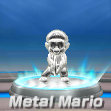
Metal Mario appears as one of two unlockable playable characters in Mario Sports Superstars, the other being Pink Gold Peach. He is unlocked separately in each sport, and players unlock him by clearing the respective Star Cups or if the player taps the appropriate amiibo card. In all sports, he is classified as a Power character, like in Mario Tennis Open. In all sports, he relies on very powerful shots but usually at the cost of speed or finesse.
In soccer, Metal Mario and Pink Gold Peach boast the highest starting shooting stats out of any character in the roster. This means they shoot the fastest balls into the goal. His in-game power, however, matches Bowser, but he boasts a significantly higher shooting stat. His passing and speed stats, as a trade-off, are his lowest stats, and he has one of the lowest passing and speed stats in the roster. Metal Mario's amiibo card also shows low finesse, which means his shots are less accurate than shots made by other characters in the roster, including his counterpart Pink Gold Peach. If Metal Mario receives a star from clearing Star Cup, his power becomes maximum, and his speed and finesse stats see improvement. With a Superstar from an amiibo scan, Metal Mario sees these two stats receive further improvement.
In baseball, Metal Mario bats and fields with his right hand. Metal Mario is one of the few characters in the roster (along with Pink Gold Peach) that can pitch a ball of all types, though unlike other power characters, he and Pink Gold Peach have below average stamina, though higher stamina than the speed characters. This means that they tire more quickly, and the more they pitch, more difficult it is to pitch a desired ball speed and curve. As a power character, his strongest stats are his hitting and fielding, meaning that he can hit farther with his bat and potentially score homeruns. Despite his card listing lower than average velocity, his pitch speed at 138 km/hr is the highest base speed in the roster, beating even speed characters that typically have high velocities. Metal Mario's lowest stat by far is his speed, which is one of the lowest in the game (however still higher than Bowser's or Rosalina's), but his stat improvements are focused on his speed: with a superstar boost from the amiibo card his speed is increased significantly to the point he can outpace even other boosted superstar Speed-type characters barring Diddy Kong.
In tennis, Metal Mario plays similar to his version in Mario Tennis Open. He has the same displayed stats on the amiibo card as Pink Gold Peach and receives similar boosts to her.
In golf, his default drive is 228 yards, the second highest in the roster (after Bowser), and his shots travel very high in a draw trajectory, making it more affected by wind than any other trajectory, though he can more easily traverse over taller obstacles. Metal Mario must be unlocked separately for each sport by winning the Star Cup in each sport's tournament mode or by tapping in a corresponding Metal Mario amiibo card.
In horse racing, Metal Mario has similar stats on his amiibo card to Pink Gold Peach, including boosts. In-game stats show that Metal Mario, compared to Pink Gold Peach, sacrifices a small amount of turning for better stamina. Metal Mario, as he is a power character, specializes in recovery while trading off for lower speed and turning. This means his horse tires less quickly when he is boosting. Metal Mario's AI uses the basic all-around horse similar to Mario's AI, including a similar coat, but his decorations do differ in harder difficulties. In the Advanced difficulty, his horse wears a gray regular bridle and saddle with silver star ornaments. In Pro difficulty, his horse has the complete set of white-colored European-style accessories.
Most of Metal Mario's animations are identical to Mario's, with a few exceptions:
- If Mario scores a double bogey or worse in golf, a Green Shell hits him and he reverts to Small Mario. If Metal Mario scores a double bogey, he is hit by one shell before getting buried by many Green Shells and Red Shells, although he retains his form.
- In baseball and soccer, Mario's special shots surround the ball in red fire. Metal Mario's special shots surround the ball in gray flames.
Metal Mario additionally has Fire Flower gear similar to Mario, though grayscale. As with the rest of the cast, Metal Mario has special amiibo cards that boost his stats. Unlike most of the cast, several of his cards feature Metal Mario in original poses, with only golf using recycled art.
Merchandise
Metal Mario has received some merchandising including plushies and mini figures. Some of them promote Super Mario 64, Metal Mario's game of origin, while several promote Mario Kart 7 and Mario Kart 8, which have featured Metal Mario as part of the playable roster. Metal Mario has been included in various lines of Jakks Pacific World of Nintendo series as a minifigure, posed in a fist-bump similarly to Mario as well as the other Mario powerups. He has an articulated figure in the same series, which has an includes a gold trophy from Mario Kart 8 as an accessory. He has also received a plushie in the series, having a metallic fabric material. The Japanese plushmaker San-ei has released Metal Mario in a wave with Dry Bowser, which was first announced in late 2019[8] and later distributed by Little Buddy. Metal Mario is featured alongside other powers up in the Super Mario Power Up series, such as the keychains. The silver Mario amiibo resembles Metal Mario, though scanning it in Super Mario Odyssey unlocks the golden outfit rather than Metal Mario's outfit.
Metal Mario also has a themed controller as part of the Wii U fight pad series alongside Mario, Luigi, Wario, Peach, Yoshi, Donkey Kong, Link, and Samus.
Some of the merchandise featuring Metal Mario includes his eye details such as the The World of Nintendo plush and minifigures as well as the Super Mario Power Up series. Other merchandise, however, lack the eye details, more closely resembling Metal Mario in most games, such as the plush from the San-ei brand as well as the pull-up race cars.
List of appearances
| Title | Description | Release date | System/format |
|---|---|---|---|
| Super Mario 64 | Power-up | 1996 | Nintendo 64 |
| Super Smash Bros. | Boss | 1999 | Nintendo 64 |
| Mario Golf | Unlockable playable character (Western releases only) | 1999 | Nintendo 64 |
| Mario Artist: Paint Studio | Stamp | 1999 | Nintendo 64DD |
| Mario Party 2 | Power-up (Bowser) | 1999 | Nintendo 64 |
| Dr. Mario 64 | Secret boss, unlockable playable character | 2001 | Nintendo 64 |
| Super Smash Bros. Melee | Power-up, trophy, boss | 2001 | Nintendo GameCube |
| Nintendo Puzzle Collection (Dr. Mario) | Unlockable playable character | 2003 | Nintendo GameCube |
| Mario Party 6 | Power-up | 2004 | Nintendo GameCube |
| Super Mario 64 DS | Power-up (Wario only) | 2004 | Nintendo DS |
| Mario Party 7 | Power-up | 2005 | Nintendo GameCube |
| Super Smash Bros. Brawl | Power-up | 2008 | Wii |
| Mario Kart 7 | Unlockable playable character | 2011 | Nintendo 3DS |
| Mario Tennis Open | Unlockable playable character (scan QR Code) | 2012 | Nintendo 3DS |
| Mario Kart 8 | Unlockable playable character | 2014 | Wii U |
| Super Smash Bros. for Nintendo 3DS | Power-up | 2014 | Nintendo 3DS |
| Super Smash Bros. for Wii U | Power-up | 2014 | Wii U |
| Puzzle & Dragons: Super Mario Bros. Edition | Playable character (leader teammate) | 2015 | Nintendo 3DS |
| Mario Kart Arcade GP DX | Playable character (playable in update in July 1, 2015) | 2015 | Arcade |
| Mario Sports Superstars | Unlockable playable character | 2017 | Nintendo 3DS |
| Mario Kart 8 Deluxe | Playable character | 2017 | Nintendo Switch |
| Super Mario Odyssey | Unlockable costume | 2017 | Nintendo Switch |
| Super Smash Bros. Ultimate | Power-up, spirit, boss | 2018 | Nintendo Switch |
| Mario Kart Tour | Unlockable playable character | 2019 | iOS, Android |
| Super Mario 3D All-Stars | Power-up | 2020 | Nintendo Switch |
| Mario Kart Live: Home Circuit | Unlockable costume for Mario and Luigi | 2020 | Nintendo Switch |
| Super Mario Bros. Wonder | Form for Mario and friends during a Wonder Effect | 2023 | Nintendo Switch |
Profiles
- Main article: List of Metal Mario profiles and statistics
Metal Mario is depicted as a slow, super heavyweight character that specializes in high amounts of weight, defense, and offense (with usually the highest power of the roster, rivaling or even surpassing Bowser) at the immense cost of agility (though if the player scans an amiibo card for baseball, Metal Mario is granted high speed), with Mario Kart 7 adding that his size contrasts with his sturdiness. Mario Kart 7 has additionally stated that Metal Mario is Mario's rival, though this has not been mentioned otherwise.
Gallery
- For this subject's image gallery, see Gallery:Metal Mario.
Artwork of Metal Mario in Hazy Maze Cave in Super Mario 64
Stamp from Mario Kart 8
Screenshot from Sky Peak 1 from Mario Sports Superstars
Render of Metal Mario in Super Mario 3D All-Stars
Media
Music
| File info 0:30 |
| File info 0:30 |
| File info 0:29 |
| File info 0:30 |
Metal Mario's voice
| File info |
| File info |
| File info |
| File info |
| File info |
See also
Names in other languages
| Language | Name | Meaning | Notes |
|---|---|---|---|
| Chinese (simplified) | 金属马力欧[?] Jīnshǔ Mǎlì'ōu |
Metal Mario | |
| Chinese (traditional) | 金屬瑪利歐[9] Jīnshǔ Mǎlì'ōu |
Metal Mario | |
| Dutch | Metalen Mario[?] | Metal Mario | |
| French (NOA) | Mario de métal[?] | Metal Mario | |
| French (NOE) | Mario de métal[?] | Metal Mario | |
| Métal Mario[10] | - | ||
| German | Metall-Mario[?] | Metal Mario | |
| Italian | Mario metallo[?] | Metal Mario | |
| Testa di Ferro (Wario variant) [11] | Iron Head | ||
| Korean | 메탈마리오[?] Metal Mario |
Metal Mario | |
| Portuguese (NOA) | Mario metálico[?] | Metallic Mario | |
| Portuguese (NOE) | Mario Metálico[?] | Metallic Mario | |
| Russian | Марио-металл[?] Mario-metall |
Metal Mario | |
| Spanish (NOA) | Mario de metal[?] | Metal Mario | |
| Spanish (NOE) | Mario de Metal[?] | Metal Mario |
References
- ^ VGArtAndTidbits (October 11, 2018). Shigeru Miyamoto interview from the 1991 book “Mario Mania” - the official Super Mario World strategy guide. Also included is isolated and cleaned art of Yoshi’s concept sketch from the upper left corner of the third page.. X.
- ^ Japancommercials4U2 (December 29, 2009). Super Game Boy JPN Commercial. YoUTube. Retrieved September 19, 2020.
- ^ Kid Leaves Stoop (March 19, 2021). The most overused game graphic you never noticed | Texture Archaeology (01:54). YouTube. Retrieved May 24, 2024.
- ^ 2004. Super Mario 64 DS instruction booklet. Nintendo of America (American English). Page 21.
- ^ Jackson, Ben J.. "Super Mario 64 DS - Jolly Roger Bay Star 7 - Through The Jetstream" (00:46). YouTube. Retrieved May 24, 2024.
- ^ nintendaan (March 10, 2017). NOE PR - RACERS OF ALL AGES CAN LAUNCH OFF THE GRID ANYTIME, ANYWHERE, WITH ANYONE, WHEN MARIO KART 8 DELUXE RACES ONTO NINTENDO SWITCH ON 28TH APRIL. GoNintendo. Page 1. Retrieved May 24, 2024.
- ^ Ell10t (July 27, 2020). Metal Mario in "After Tutorial" Pipe in Mario Kart Tour. YouTube. Retrieved July 27, 2020.
- ^ @sanei_NLG (November 21, 2019). X. Retrieved January 25, 2022.
- ^ Nintendo Switch 佳節禮物遊戲大合集. Nintendo HK (Traditional Chinese). Page 5. Retrieved February 3, 2021.
- ^ Super Mario™ 3D All-Stars pour la console Nintendo Switch™. Nintendo.com (French). Archived January 16, 2021, 20:20:58 UTC from the original via Wayback Machine. Retrieved November 10, 2021.
- ^ 2005. Super Mario 64 DS European booklet. Nintendo of Europe (Italian). Page 97.
- Doctors
- Dr. Mario 64 characters
- Forms
- Humans
- Playable characters
- Final bosses
- Mario lookalikes
- Mario forms
- Mario Golf (Nintendo 64) characters
- Mario Kart 7 characters
- Mario Kart 8 characters
- Mario Kart Arcade GP DX characters
- Mario Kart Tour characters
- Mario Sports Superstars characters
- Mario Tennis Open characters
- Puzzle & Dragons: Super Mario Bros. Edition leaders and helpers
- Siblings
- Super Mario 64
- Super Mario amiibo line
- Super Smash Bros.
- Super Smash Bros. Melee
- Super Smash Bros. Melee trophies
- Super Smash Bros. series bosses
- Super Smash Bros. Ultimate spirits
